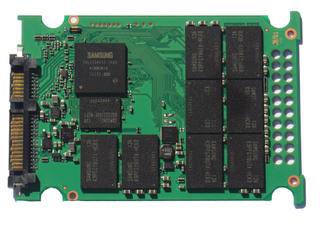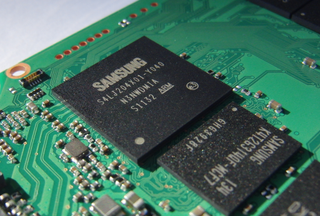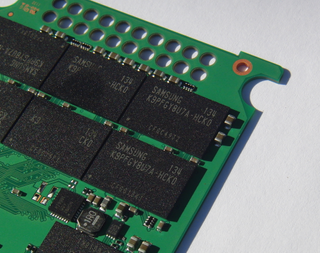Samsung Goes 6 Gb/s: Is The 830-Series SSD King Of The Hill?
Inside Samsung's 830-Series SSD
Max Controller: More Horsepower

Samsung gives its latest Max controller a much-needed upgrade in order to handle 6 Gb/s signaling. The previous Max controller (S3C29MAX01), used to power the 470-series drives, was based on a dual-core ARM9 design. The 830 series ups the ante by adding another ARM9 core, yielding a triple-core controller. Beyond some firmware optimizations for performance, the controller really only differs in its incorporation of more processing power, as the faster SSD has to handle I/O requests at a faster rate.
As with its previous drives, Samsung is still using an eight-channel design.

The memory buffer design isn't changed, either. The 830 series' Max controller (MCX) is still paired with 256 MB of DDR2-800 DRAM, which is used to cache data and serve as a scratch space for the three A9 cores.
27 nm Toggle-mode 1.0: Something Old, Something New
Samsung is also moving to a smaller lithography node, as the 830 features NAND from the company’s 27 nm process. Previously, the 470-series SSDs relied on Samsung's older 32 nm node.

We're still dealing with 32 Gb flash, though. When you crack the drive open, you see that the 256 GB model only employs eight total memory packages, and each package hosts eight 4 GB dies. That's double the package density of the NAND on the 470, which used 16 memory packages to reach 256 GB.
Stay on the Cutting Edge
Join the experts who read Tom's Hardware for the inside track on enthusiast PC tech news — and have for over 25 years. We'll send breaking news and in-depth reviews of CPUs, GPUs, AI, maker hardware and more straight to your inbox.
On the performance end, the company continues to believe its Toggle-mode DDR NAND offers superior performance to the ONFi interface used by Micron and Intel. Several vendors currently use Toggle-mode DDR NAND from Samsung and Toshiba to deliver high-end performance. If we turn back to Second-Gen SandForce: Seven 120 GB SSDs Rounded Up, we see that Mushkin’s Chronos Deluxe and Patriot's Wildfire (the two top performers) outclass all of the other SSDs in our comparison.
The problem with Toggle-mode memory is that it also costs the most. Consequently, the Mushkin and Patriot drives bore significant premiums over the rest of the field in our first look. Samsung claims it'll continue to drive down prices for Toggle-mode DDR with the new 27 nm node.
Current page: Inside Samsung's 830-Series SSD
Prev Page Is Samsung's 830-Series The New King? Next Page Test Setup And Firmware Notes-
pbrigido With all of these fast SSDs coming to market, I can only hope that the competition starts to drive down prices soon.Reply -
I still opt for the M4 in all the enthusiast builds I do!Reply
It boils down to reliability, not one hiccup on M4 yet (or any crucial drive Ive installed), 4/5 Sandforce drives I have installed have had some form of callback problem to resolve once deployed, mostly requiring firmware updates, but a few failed drives as well!
Mind you, still better than the early Corsair force Series I used, every single one failed! Stopped using them quick!
Am tempted by OCZ, once they have reliability on their side I will give them a go again! -
Would love to see an article addressing Sandforce controller problems people have been experiencing.Reply
-
mark_hamill Would love to see an article addressing Sandforce controller problems people have been experiencing.Reply -
JamesSneed Looks like a really nice SSD. Samsung has one of the best validation proceses along with Intel and Crucial so I really don't expect people to have issues like they do with OCZ drives. Now the real question how much will it be on the egg?Reply
I saw this quote below in the summary and laughed as nobody in there right mind would use a basic MLC drive in a database server. So Samsung tuned the drive for what it will be used in ,desktops, good.
"Although we'd probably think twice before picking this as our first choice for a database server, it does just fine in an enthusiast's machine." -
JohnnyLucky great review. now we just have to wait and see how the ssd will hold up over the long haul. If it is anything like the 470, then it should be problem free.Reply -
beenthere We'll see how this series of Samsung SSDs fair. The previous gen was a nightmare of problems so I don't think Samsung's validation process is any better that the rest of the SSD suppliers - which is sad when Samsung controls everything including NAND production. It's amazing that we still have SSDs NOT readt for Prime Time.Reply -
AppleBlowsDonkeyBalls beenthereWe'll see how this series of Samsung SSDs fair. The previous gen was a nightmare of problems so I don't think Samsung's validation process is any better that the rest of the SSD suppliers - which is sad when Samsung controls everything including NAND production. It's amazing that we still have SSDs NOT readt for Prime Time.Reply
Proof? I think you just pulled this out of your ass or from someone's that told you some story. The 470 series was VERY reliable.
Most Popular

